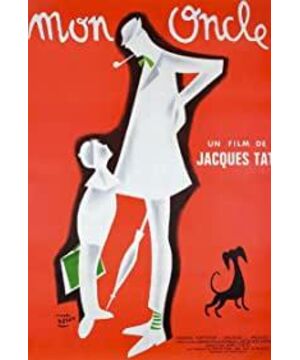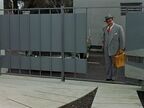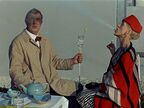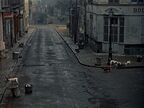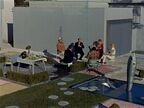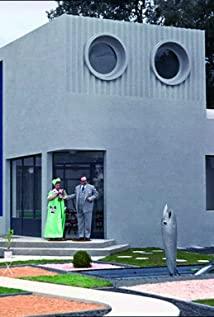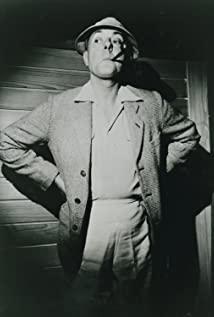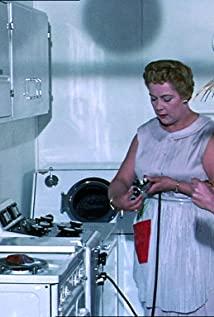The Sunday party of the Arbelles, steeped in boredom from start to finish, is reminiscent of Buñuel.
This is Jacques Tati's "My Uncle," a masterpiece that resembles a silent comedy. The film has very little dialogue, and the characters seem to be a bit masked, but they win with a lot of exaggerated performances and detailed depictions.
Men who reject routines. Hulot, played by Jacques Tati himself, uses his stupidity and madness to fight what people see as a "decent" life. On my brother-in-law's plastic hose production line, he can turn the hose into sausage-shaped pieces; he can clumsily puncture the water pipe of a fountain at a Sunday party; Pockets... In short, wherever Mr. Hulot appears, there is chaos (on a small scale). Hulot's goofy, casual vandalism, which doesn't hurt anyone, elevates it to a graceful clumsiness that degenerates into a hilarious and haunting cuteness. If Don Quixote is the first slightly violent rock, then Uncle Huluo is a relaxed and eclectic RAP. Although this image is not subversive, it is true to the rhythm of modern industrial life. The sarcasm is sharp.
Petty fantasy bubbles. It is understandable that petty bourgeoisie is an emotion to mediate life. What if petty bourgeoisie becomes life itself? Jacques Tati told the audience his answer in the movie: BS Petty Bourgeoisie. The Albelle couple prepared surprises for their wedding anniversary: a fully automatic garage door and a new car, both of which were locked in the garage; and their apartment's proud fish-shaped fountain - the most important prop in the whole film - - As long as the distinguished guests come, the fountain must be turned on before the door is opened, and it will be open until the guests leave the house. If "one's own person" and "inferior people" come in, the fountain will be turned off immediately, and no electricity will be wasted. Later, the fish-shaped fountain was destroyed by another killer move by Mr. Hulot "inadvertently". Here, the director also exposed the hypocrisy and illusion of the petty bourgeoisie.
Back to basics attitude. There is a polar opposite world in the movie: the puppies at the beginning already have a hint to the audience (a pack of wild dogs and a clothed house dog). In the simple streets and alleys, people sweeping the streets, dragging household goods, bargaining at the market, children's pranks, Mr. Hulot must use the glass to reflect the neighbor's bird in the morning to make it sing... A lot of details are accompanied by With moving music, ramble on trivial but not boring, it seems that life itself is a lyrical and simple idyll... And at the other end of the world, we see those who are very similar to "A Clockwork Orange" with the future. The modernist garden, the furniture, all belonged to the Arberles, and when the camera swept across the cool-toned villa, Jacques Tati stopped his music without hesitation - just like Arber The Baylors saw untimely guests turn off their fish fountain. In this dreary world, the artificiality, emptiness and boredom of life are vivid in my eyes, and this stagnant water can only be stirred up occasionally by the intervention of Mr. Hu Luo.
At the end of the film, Jacques Tati slightly provocatively made the Arbel and his son a sign of reconciliation. This should not be the point. The important thing is that our Mr. Hulot is on the road again. When he wants to rest, he may Like his bicycle in the picture, it will be placed in someone else's car seat - someone else will drive me away, what's the big deal?
View more about Mon Oncle reviews


